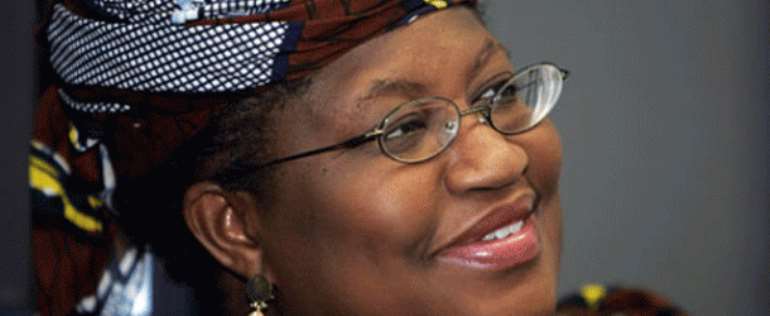Nigeria's GDP rises by seven per cent'

With an average of seven per cent growth rate of the Gross Domestic Product (GDP) consistently for the past 10 years, the nation's economy is on the path to more development, according to the Minister of Finance and Co-ordinating Minister of the Economy, Dr. Ngozi Okonjo-Iweala.
The minister said that the existing growth was in contrast with an average of 2.4 per cent recorded over the previous 10 years.
She also said that the existing administration had succeeded in reducing the recurrent expenditure in the 2013 fiscal plan to 68 per cent, against 71 per cent of the 2012, and that plans were under way to bridge the widening gap of inequality in income distribution.
On Monday too, the Governor of the Central Bank of Nigeria (CBN), Malam Lamido Sanusi, said that no amount of criticism could make the Monetary Policy Committee to change its mind on the nation's interest rate benchmark of 12 per cent, except this was necessary.
He said that the committee was not in a hurry and that nobody should be in a hurry too, adding that it was still monitoring the developments to be satisfied with the need for and possible change.
Both the minister and Sanusi made the disclosure at the fourth yearly Investors' Conference of the Renaissance Capital in Lagos yesterday.
According to the minister, the time has come for the nation to admit its shortcomings, which continue to stare it in the face, while proactively seeking ways to overcome them.
She noted that unemployment which was put at over 23 per cent and rising underemployment in the formal sector and inequality – uneven distribution of wealth and widening gap between the haves and have-nots – had become a national worry and weekly 'agenda at the Federal Executive Council meeting.'
'We are not minimising our challenges. What we are saying is that the present administration is worried about the issues and working hard to fix them. Some of our challenges are global in nature, even the United States (U.S.) and Europe are going through them now.
'Nigeria is an exciting country to be in. While some are looking at the challenges, others are seeing opportunities from the challenges. Nigeria's economy is resilient despite the challenges and that is why it maintained the growth record all these years,' she said.
According to her, 'the new strategy included ensuring the fiscal consolidation and growth. This means that there will be less borrowing, increased spending and investments into areas of challenge. Our target is to reduce recurrent expenditure to 65 or 60 per cent by 2015 and plans are being perfected.
'IMF has just concluded its Article IV and the report in debt dynamics for the country was positive. The debt to GDP is at 20 per cent, though high, but it is above global standard.
'There are also plans to establish a source of long-term capital. So, plans are under way for the establishment of a development financing institution, with private sector and multilateral organisations participating.
'Reforming the mortgage sector is also top priority. The World Bank is in partnership with Nigeria and has given $300 million pledge for its take-off. The mortgage sector would offer huge employment opportunities.'
On his part, Sanusi said: 'It is very easy to take financial and economic stability for granted, especially when there is seeming stability in the financial system. Even with low rate at this point, banks may still not be able to lend.
'There are structural issues that necessitated the decision. Banks cannot lend even at low rate with poor power supply, which would not guarantee stable operations. Unemployment is still high and no bank would want to lend to people without stable jobs and stream of income,' he said.
He explained that the cash-less project was a combination of other institutions – the telecommunications and the National Communications Commission, hence their ineffectiveness would also affect the project.
Sanusi also decried the nation's dependence on oil, noting that the existing global view of oil may not be healthy for the economic sustainability of the country.
'Agriculture and power sector development is the game changer for the economy. It will ensure equitable income distribution. All we need to do is to develop the sector for better results.
'Nigeria is the largest cassava producer in the world, but the problem lies in the development of the value chain. We produce tomato in the country, but we remain the highest importer of tomato paste. The value is capable of creating the job opportunities that unemployed people are looking for,' he added.
Earlier, the Chief Executive Officer of Renaissance Capital, West Africa, Yvonne Ike, said that 'there is a phenomenal growth revolution in Africa and Nigeria is at the forefront.'
Ike reeled out the challenges facing the continent and the country, including infrastructure, illiteracy, corruption and security, saying that the continent and the country had defied these odds to beat the global record in growth terms.
'Nigeria is a resilient economy. MTN Nigeria came into the country in 2002 amid infrastructure challenges. It was not long, it started declaring profits in millions. GZI, a can-manufacturing company, started with a total asset worth $14 million. Last year, the company was bought at over $400 million. Banks are rebounding after the reforms, with some declaring huge profits.
'If government can raise 1,000 mega watts of power, the nation's GDP will rise by 50 basis point in one year. We believe that Nigeria is leading the change in Africa and that is why we are committed to the capital market development.
'The investors cannot wait until everything is fixed, because they can bring the change by their activities. The economy is still growing despite the challenges and leading other world economies in growth. The truth is that the government has taken many steps to address these problems,' she added. (Guardian)
